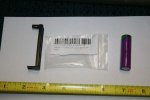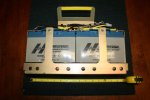Sarcasm doesn't suite you.
As of this moment the water bottles have been in the freezer for 3 hours. I checked them and they are all "slushy ice" . In a few more hours I expect them all to be frozen solid.
Only being a little sarcastic in response to the tone in your response. I'm more than slightly interested in this kind of stuff. I
love this stuff. I'm that kind of geek. And I'm not afraid to be wrong.
I've started a capacity test here at the house on one of my units. Photos of the setup and the initial data charts here -
https://photos.app.goo.gl/H1Tp2Z9jPTCIr3XN2
The two green traces on the one chart are the milk jugs. The orangish trace on that same chart is the condenser discharge air temp. I'm not using that for any actual calculations. Just curious about the cycling of the compressor as things progress. Each of the milk containers has a measured 4lb and 4oz of water in them.
The second chart with the red and green traces is the current outside temperature here at the house. The units are outside.
When I placed the milk containers in the unit the chamber temperature rose high enough to alarm. You can see in the photos I put a small cooling rack in the bottom of the chamber to keep the milk containers from touching the bottom or the sides. Wanted to encourage as much airflow as possible for best heat transfer.
Based on the standard heat of fusion of water this mass represents about 1290 kJ of energy. Using the temperature and time data we should be able to calculate the approximate thermal capacity of the system as a whole.
I'll update the data in the image folder above as things progress. If anyone is enough of a geek to want to see the data in real time you can drop me a PM. The unit I'm using to capture the data is online.
Edit - In the first hour the containers have dropped 16 degrees. They have a total mass of 8.5lbs. That equals ~135 btu/hr.










